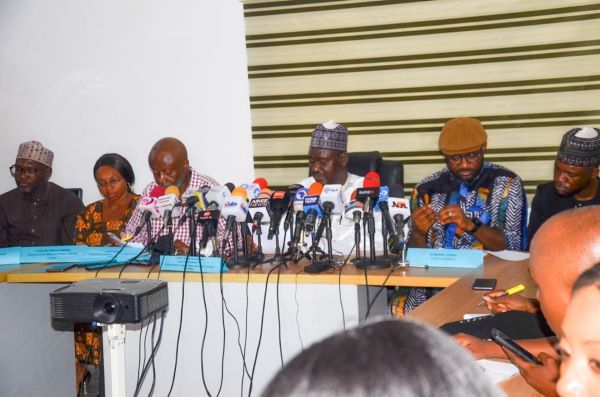ASHENEWS reports that the Civil Society Legislative Advocacy Centre (CISLAC), leading other civil society organisations in Nigeria, has raised the alarm on the looming threat of corruption to the country’s democratic progress.
Joined by representatives from over 50 organizations at a press conference in Abuja on Thursday, CISLAC urged stakeholders to unite in the fight for a corruption-free Nigeria.
While emphasizing the collective responsibility to combat the menace at all levels of society, CISLAC called for concrete actions to address the pervasive issue, and also urged Nigerians to move beyond despair by taking steps towards building a more transparent, accountable, and equitable society.
“Although our nation faces numerous challenges that may lead to feelings of despair and a temptation to abandon our patriotic responsibilities in nation-building, millions of Nigerian citizens have invested their hopes in democracy,” the CISLAC’s Executive Director and Chairman of the Board of Amnesty International, Auwal Rafsanjani said.
According to him, there is a groundswell of expectation that, as our fledgling democratic system of government takes shape, it will address the deprivations faced by long-suffering citizens.
ALSO READ Nigeria climbs 5 places in 2023 Global Corruption Perception Index
“In spite of the lack of significant and sustainable progress in our nascent democracy over the past twenty-four years, the people at the grassroots level in Nigeria still maintain their faith in and desire for a democratic system.
“Despite its flaws, democracy remains the most effective means for citizens to actively participate in governance and for us as a nation to achieve our collective goals. It is important to remember that millions of Nigerians bravely fought for democracy making significant sacrifices in the process,” he said.
One of the key areas of concern highlighted by Rafsanjani during the conference was judicial corruption, where he pointed out that it constitutes a major challenge to anti-corruption work in Nigeria.
“The looters have repeatedly used their influence to manipulate the judicial process and system, to block and/or delay the arrest or prosecution of suspects. This blatant disregard for the rule of law has eroded public trust and reinforced the perception that Nigeria’s democracy is nothing more than a façade.
“Clearly, the judiciary is not living up to its responsibility of ensuring that the rule of law and provisions of the constitution are upheld. There have been several allegations of judicial officers receiving bribes from politicians and politically exposed persons in-order to circumvent the law.
“This has watered down the respect, trust and confidence of citizens in the judiciary and negatively impacted the fight against corruption,” he added.
Addressing the role of corruption enablers, both domestic and international, in facilitating illicit financial flows, Rafsanjani noted, with alarm, the involvement of foreign entities from countries like Switzerland, Monaco, and the United Kingdom in aiding the menace in Nigeria.
ALSO READ Workers Day: CISLAC demands social protection for workers
He further raised concerns about the procurement of political power by individuals facing corruption allegations, which he argued, undermines anti-corruption efforts and perpetuates a culture of impunity.
Positing that that inadequate budgetary allocations to anti-corruption agencies pose significant obstacle in the fight against the menace, Rafsanjani criticized what he described as “poor resource allocation” as a calculated attempt to gradually push these agencies towards extinction.
“By limiting their resources, the government is effectively crippling their ability to function effectively and independently.”
The conference also addressed the rising tide of disinformation surrounding anti-corruption efforts, which he described as a desperate attempt by corrupt elements to disinform, mislead, misinform and confuse Nigerians on the efforts of various anti-corruption institutions in Nigeria.
“We are worried over the poor understanding of the work and mandates of the anti-corruption agencies by many Nigerians including the youth, whose active involvement is crucial in combating corruption,” he stressed.
Also speaking, a Senior Fellow at the Centre for Democracy and Development (CDD), Prof. Jibrin Ibrahim said while the menace is not new to Nigeria, its current extent has become a severe impediment to effective governance.
“Corruption now hampers the government’s ability to fulfill its primary duty of ensuring the welfare and security of Nigerians.
ALSO READ Loan: CISLAC tells FG to investigate spending by previous govts
“The alarming reality is that corruption is not just a challenge; it’s actively undermining the Nigerian state. The judiciary, meant to be a bulwark against corruption, has been compromised, with corruption enablers infiltrating and influencing its functions,” he said
Ibrahim, furthermore said the anti-corruption agencies face relentless attacks from corrupt individuals in power, rendering them ineffective.
According to him, this systemic corruption extends to various government ministries, where embezzlement has become rampant, hindering essential services and aid delivery.
“If left unchecked, this corruption will erode our nation’s institutions and plunge us into chaos. We cannot allow this path of self-destruction to continue. We must unite to combat corruption and safeguard the future of our country,” Ibrahim urged.
CISLAC and the coalition of civil society organizations issued a set of recommendations aimed at addressing the root causes of corruption and strengthening anti-corruption efforts in Nigeria.
These recommendations include calls for strengthening the autonomy and integrity of the judiciary, ensuring transparency and accountability in governance and holding political parties accountable for members facing corruption allegations.


